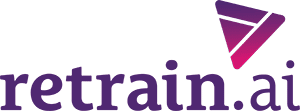This was originally posted on CIO Review
The COVID-19 pandemic has stirred up a digital storm; even with the organizations that were once wary of emerging technologies switching to digitalization. But, in their rush to implement the technologies that can keep their business engines running, organizations are often overlooking one crucial aspect—their workforce. In order to facilitate a seamless adaptation to the new technology, organizations also need to retrain and upskill their workforce accordingly. This is where NY-based retrain.ai cements its cornerstone.
Today, retrain.ai, using the power of big data and artificial intelligence, is solving the skill gap for both private and public sectors, empowering them to evolve their workforce in step with their technological implementations. “Our main objective is to equip the workforce with the right set of skills, so they can adjust to changes in jobs requirements and become an organization’s greatest competitive advantage,” says Dr. Shay David, co-founder and CEO of retrain.ai.
Making this possible is retrain.ai’s eponymous AI platform, which helps organizations leverage ‘data’ to retrain and upskill their workforce. The platform is designed to consolidate all data from the different silos within an organization and synthesize it with crucial information from other external sources. Essentially, the platform combines three robust datasets with information about people, jobs, and training programs, before generating useful, validated, unbiased, and actionable workforce intelligence to guide the workforce through the upskilling process.
The competencies of the platform, however, are not just limited to skills matching and training recommendations. The platform supports all the phases of the talent lifecycle—from pre-hire planning, requirement mapping, talent acquisition, employee assessment, and performance management through to employee development and (re)training. “These are the five areas that every large organization has to deal with when talking about talent,” states David, “and we are here to simplify it for our clients.”
He also sheds light on the retrain.ai’s unique intelligence engine, SoFi (Skills of the Future Index), which is designed to help organizations guide and grow their employees. SoFi gives organizations the talent intelligence to create skill mapping, thus enabling them to strategically match employees to different positions within the organization. The business intelligence (BI) capabilities of SoFi enable clients to reinforce their strategic workforce planning, talent acquisition, talent mobility, diversity and inclusion, and learning and development with grounded insights that deliver results. SoFi also gives organizations a comprehensive, multidimensional analysis of employee’s knowledge, skills, qualifications, and personal attributes.
“When it comes to implementing the solution within organizations, we follow a four-dimensional onboarding process—namely, Discovery, Design, Development, and Deployment—that anchors the organization’s ability to understand their skill gap and utilize that to design a customized solution that has a lot of integration points,” highlights David. “This is because, at the end of the day, our intention is not to replace an organization’s existing human capital management stack, but to add intelligence to it.”
To best explain how these capabilities help retrain.ai’s clients, David shares a client story where a health maintenance organization (HMO) was trying to upskill 1500 individuals. The HMO also sought to identify their leadership qualities, so they could pick the right persons for a few regional managers positions. retrain.ai helped the client by leveraging their AI platform for mapping the entire organization’s high potential individuals, charting their career pathways and selecting the persons that will best fit the positions.
Furthermore, the mapping data provided by retrain.ai also helped the client to improve retention rates and cut hiring costs. By identifying the loose knots in their workforce and taking the necessary steps to retrain and upskill according to their needs, the HMO succeeded in reducing employee turnover and creating motivated teams which directly affected their business performance.
Even though retrain.ai already has one of the world’s largest taxonomies in the labor market, the company is continuously expanding and curating its datasets, staying ready to provide its clients with relevant insights that can help their organizations grow. Simultaneously, the company is also growing its business across the US. “In the coming months, we will keep adding new capabilities to our platform and augmenting it with emerging technologies so that our clients are always one step ahead of the technological evolution,” concludes David.

